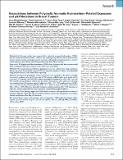| dc.contributor.author | Mordukhovich, Irina | |
| dc.contributor.author | Rossner, Pavel | |
| dc.contributor.author | Terry, Mary Beth | |
| dc.contributor.author | Santella, Regina | |
| dc.contributor.author | Zhang, Yu-Jing | |
| dc.contributor.author | Hibshoosh, Hanina | |
| dc.contributor.author | Memeo, Lorenzo | |
| dc.contributor.author | Mansukhani, Mahesh | |
| dc.contributor.author | Long, Chang-Min | |
| dc.contributor.author | Garbowski, Gail | |
| dc.contributor.author | Agrawal, Meenakshi | |
| dc.contributor.author | Gaudet, Mia M. | |
| dc.contributor.author | Steck, Susan E. | |
| dc.contributor.author | Eng, Sybil M. | |
| dc.contributor.author | Teitelbaum, Susan L. | |
| dc.contributor.author | Neugut, Alfred I. | |
| dc.contributor.author | Conway-Dorsey, Kathleen | |
| dc.contributor.author | Gammon, Marilie D. | |
| dc.contributor.author | Sagiv, Sharon Karnit | |
| dc.date.accessioned | 2011-02-20T20:19:01Z | |
| dc.date.issued | 2010 | |
| dc.identifier.citation | Mordukhovich, Irina, Pavel Rossner, Mary Beth Terry, Regina Santella, Yu-Jing Zhang, Hanina Hibshoosh, Lorenzo Memeo, et al. 2010. Associations between polycyclic aromatic hydrocarbon–related exposures and p53 mutations in breast tumors. Environmental Health Perspectives 118(4): 511-518. | en_US |
| dc.identifier.issn | 0091-6765 | en_US |
| dc.identifier.uri | http://nrs.harvard.edu/urn-3:HUL.InstRepos:4728489 | |
| dc.description.abstract | Background: Previous studies have suggested that polycyclic aromatic hydrocarbons (PAHs) may be associated with breast cancer. However, the carcinogenicity of PAHs on the human breast remains unclear. Certain carcinogens may be associated with specific mutation patterns in the p53 tumor suppressor gene, thereby contributing information about disease etiology. Objectives: We hypothesized that associations of PAH-related exposures with breast cancer would differ according to tumor p53 mutation status, effect, type, and number. Methods: We examined this possibility in a population-based case–control study using polytomous logistic regression. As previously reported, 151 p53 mutations among 859 tumors were identified using Surveyor nuclease and confirmed by sequencing. Results: We found that participants with p53 mutations were less likely to be exposed to PAHs (assessed by smoking status in 859 cases and 1,556 controls, grilled/smoked meat intake in 822 cases and 1,475 controls, and PAH–DNA adducts in peripheral mononuclear cells in 487 cases and 941 controls) than participants without p53 mutations. For example, active and passive smoking was associated with p53 mutation–negative [odds ratio (OR) = 1.55; 95% confidence interval (CI), 1.11–2.15] but not p53 mutation–positive (OR = 0.77; 95% CI, 0.43–1.38) cancer (ratio of the ORs = 0.50, p < 0.05). However, frameshift mutations, mutation number, G:C→A:T transitions at CpG sites, and insertions/deletions were consistently elevated among exposed subjects. Conclusions: These findings suggest that PAHs may be associated with specific breast tumor p53 mutation subgroups rather than with overall p53 mutations and may also be related to breast cancer through mechanisms other than p53 mutation. | en_US |
| dc.language.iso | en_US | en_US |
| dc.publisher | National Institute of Environmental Health Sciences | en_US |
| dc.relation.isversionof | doi:10.1289/ehp.0901233 | en_US |
| dc.relation.hasversion | http://www.ncbi.nlm.nih.gov/pmc/articles/PMC2854728/pdf/ | en_US |
| dash.license | LAA | |
| dc.subject | breast cancer | en_US |
| dc.subject | p53 mutation | en_US |
| dc.subject | p53 overexpression | en_US |
| dc.subject | PAH | en_US |
| dc.subject | polycylic aromatic hydrocarbons | en_US |
| dc.title | Associations between Polycyclic Aromatic Hydrocarbon–Related Exposures and p53 Mutations in Breast Tumors | en_US |
| dc.type | Journal Article | en_US |
| dc.description.version | Version of Record | en_US |
| dc.relation.journal | Environmental Health Perspectives | en_US |
| dash.depositing.author | Sagiv, Sharon Karnit | |
| dc.date.available | 2011-02-20T20:19:01Z | |
| dash.affiliation.other | HMS^Medicine-Brigham and Women's Hospital | en_US |
| dc.identifier.doi | 10.1289/ehp.0901233 | * |
| dash.authorsordered | false | |
| dash.contributor.affiliated | Sagiv, S | |


